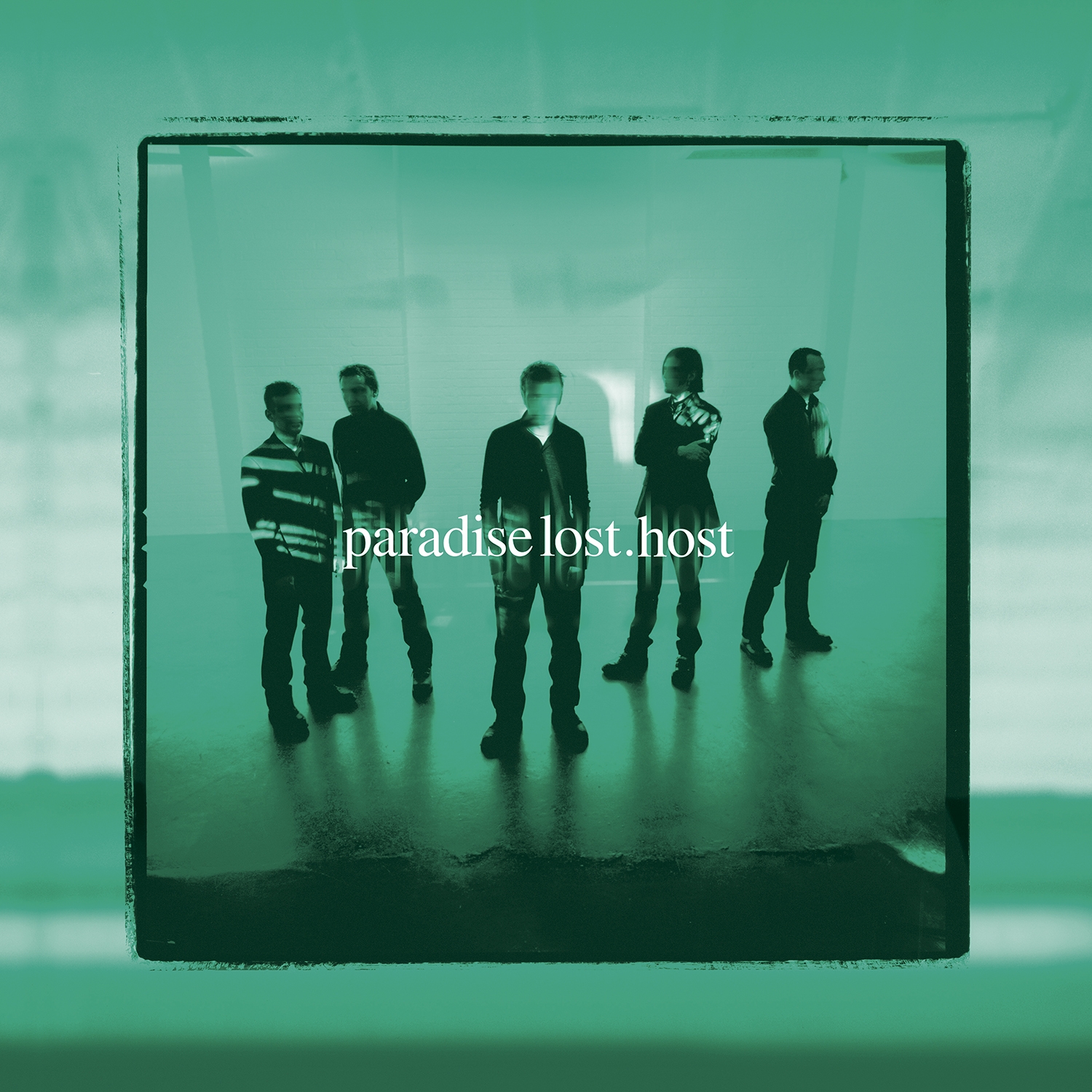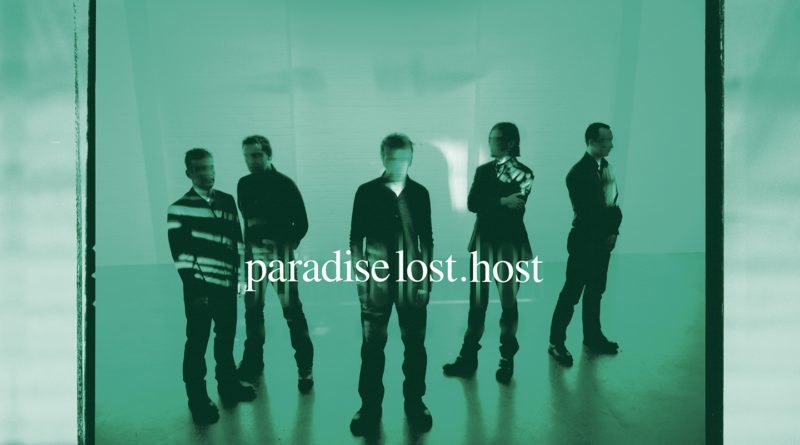ALBUM REVIEW: Host (Remastered) – Paradise Lost
PARADISE LOST are a band that have, over their long and illustrious recording career, seamlessly shifted and changed their style on multiple occasions. Not many bands can claim that they are the pioneers of one sub-genre, let alone two. Shifting from death doom to gothic metal to synth rock and back towards their death and doom metal roots with their last few records, it’s easy to view each of these musical changes within a three or four album span, and notice the marked stylistic changes that the band have undergone in the last thirty years.
Perhaps the most contentious and overlooked of all the styles PARADISE LOST have adopted is their mid-era, synth rock period, encompassing the albums from One Second through to Symbol of Life, ridding themselves almost entirely of their prior metal roots, and embracing a more keyboard centric, DEPECHE MODE-esque musical approach. Of all of their records, Host is perhaps the one album that has the least metal edge to it, even more so than the two records that sit on either side of it, One Second and Believe In Nothing; It’s for this reason that it is often overlooked, even by the bands many ardent supporters. Nonetheless, it’s one of the hidden gems in the bands back catalogue, and even without the overtly metal trappings of the six albums that preceded it, it was still able to maintain a lot of the dark and sombre gothic motifs that they are known for. With the album being remastered and reissued, it’s finally able to get the attention that it deserves, and be recognised as an unsung classic.
So Much Is Lost, the first song on the album, sets the bar impressively high; the music takes a strong electronic bent that is quite subdued, with powerful drum beats and sparse keyboard and guitar sections, allowing Nick Holmes‘ vocals to carry this track for the most part. It’s a great earworm of a track, and well and truly gets stuck in your head. The addition of violins towards the songs third quarter helps to add even more variety to the proceedings. Nothing Sacred takes the listener further into synth rock and electronica territory, with a dense, bubbling synth passage that’s very reminiscent of bands like EURYTHMICS, with some great orchestral accompaniments helping to expand the sound and maintain the gothic sensibilities that PARADISE LOST are famous for.
In All Honesty, with the droning crescendo that brings it into life, is a much darker track, with an overall more brooding and gloomy feel to the music and the delivery of the vocals. The keyboards really begin to incorporate a lot more melody than the previous two offerings, and offer a fair few hooks throughout the song, but are spread out generously in order to allow the vocals have space to be noticed and have the emotional impact on the listener that they are imbued with. Harbour makes great use of the violins and cellos, providing a lot of great hooks in amongst heavily distorted guitars and incredibly precise, measured drumming. It’s much more akin to Dark Wave than what has come before it, with a steady ambience remaining throughout.
Ordinary Days starts to bring the guitars to the fore a little more, and although they are definitely there in the mix, they never take over, become over-bearing or become the sole focus of the track. Just when you feel that you’re about to be launched into some powerful riffs, it recapitulates back to its more synth-based origins. This is a slow burning track, which gradually builds into something fairly powerful and, most importantly, catchy. It’s Too Late again takes the listener down a morose and emotive route that really allows the violin and cello pieces to take centre stage. There’s still an undercurrent of electronic music that helps helps provide plenty of atmosphere, and the incorporation of female vocals complement Nick‘s singing perfectly. It’s a great way to bring the first half of the album to a close, and has a climactic feel to it.
Permanent Solution heads back into familiar electronic territory, and is peppered with some heavily distorted guitar hooks for good measure. Nick‘s vocals are on top form for this track, and just like many of the tracks on here, it’s got catchy vocal delivery that helps to make sure that this sticks in your head immediately. Behind the Grey is another track that perfectly captures the bleak tone of the bands music and impresses it on this song indelibly. It’s got great sounding, driving drums and a thick, droning synth composition that makes it dark and powerful in equal measure. Wreck finds us back solidly in the throes of dark wave-esque ambience, with subdued vocals complementing the tone and mood of the music. It’s a song that ebbs and flows between a minimalist musical approach and more palpable sections that rise up before sliding into the background once more. It’s a great track, and does stand out quite prominently from the pack, and stands alongside the albums opener and Harbour as one of the high points of the album.
Made the Same has a distinct Indie feel to it, with energetic drumming interwoven with low key guitars turning this into a solid and memorable track. Deep is a song whose title does a great job of describing the sound that it offers; the rhythm sections sound so much fuller and noticeable than on the first ten tracks, and in spite of its more electronic/synth/goth leanings, it’s an undeniably heavy track, completely immersive and engrossing. The band settle into an almost hypnotic groove, and it’s incredibly easy to get drawn into it. Year of Summer, the albums penultimate track, is for the most part restrained on the musical front, and lets the vocals once again take centre stage, with the music only really coming to the forefront during the key parts of the song. In particular, the distorted, borderline psychedelic tone of the guitars gives this song a unique flavour that it’s hard not to love. However, it always feels like it’s building up towards a point that it never really reaches. Finally, the last, titular track arrives. Host brings together all of the best ideas on this record and as a result, this song is brilliant. Violins and cellos, sitting alongside melancholic synths and guitars, all tied together by excellent vocals, meaning that this track has little in the way of filler. This song also features the closest thing to a guitar solo on the record, and in typical Gregor Mackintosh fashion, it’s melodious and incredibly emotive. It’s a great, grandiose way to bring this record to a close.
Comparing the original version of the record and the new, remastered version, it becomes evident fairly quickly just how different each mix is. On the remastered version, the music sounds sharper and certain elements, in particular the keyboard sections and the vocals. It’s great to give it a listen and notice small things in the music and even the delivery that aren’t as immediately obvious when listening to the original mix. Hopefully, this re-issue will prompt many fans to revisit this album, and indeed this period, of the band’s history. It’s an excellent blend of electronic music, goth, rock and metal that can’t be faulted. If you’re looking for the sort of powerful, emotive and downright catchy riffing that PARADISE LOST is known for, this may not be the release for you, but for those who want to hear the band in a completely different light, it’s highly recommended. Looking back over this era of PARADISE LOST‘s recorded output, it’s clear that Host stands as one of the better of this four album long detour into synth rock, and it could even be argued that it’s one of the bands overlooked and underrated classics.
Rating: 8/10

Host (Remastered) is out now via Nuclear Blast Records.
Like PARADISE LOST on Facebook.

